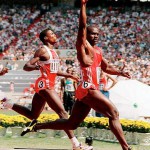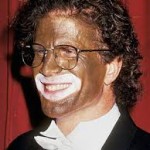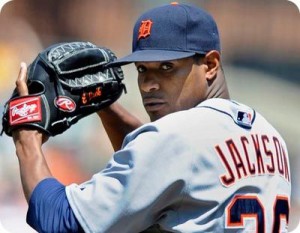
This should have been a seminal athletic moment of the 80s. It ended up being so, but for very different reasons. Photo unk via dailymail.co.uk
Editor’s note: there are spoilers in this review, and if you have not seen the film they are surprising enough that you may want to skip this post and see the film first.
The 2nd installment in the return of the “30 for 30” series aired on October 9th, 2012 and is titled “9.79*.” Directed by Daniel Gordon (a decently acclaimed british documentarian), it tells the story of the 1988 100m Men’s final from the Seoul Olympic games. As most sports fans would be able to tell from the title, the race was won by Ben Johnson in a then-world record time of 9.79, an astounding improvement upon the standing world record and a seminal event in the sports decade.
Soon after though, Johnson tested positive for the use of Steroids, was stripped of his medal and booted from the games, and the event was a shocking introduction to the world of doping and the use of performance enhancing drugs that has only exploded since. Nowadays, we hear about Baseball players using steroids and the narrative is familiar. The USADA just released its report by which it made the decision to charge and eventually ban Lance Armstrong and attempt to strip him of titles won 10+ years prior. But in 1988, the only knowledge of doping that casual sports fans knew of was allegations of eastern bloc athletes (women mostly) who were astoundingly breaking records in Swimming, Track and Weight Lifting.
(Here’s an excellent review of the film, doing it much better than I: avclub.com)
As with before, I’ll break down talking about the Subject Matter and then the film-making.
Subject Matter: the film maker got all 8 participants in the 1988 100m final to appear on film and talk somewhat candidly about the state of the sport leading up to that race, the role of drugs, and the ethical dilemna they all faced. Contrast this to prior 30 for 30 films about Allen Iverson and Michael Jordan which didn’t include any on-screen interviews from the subjects. The fact that Johnson himself speaks at length and openly about the experience makes this a pretty compelling watch. Even more-so based on points we’ll touch on later…
The film starts off with an anonymous quote, “If you don’t take it, you don’t make it.” The implication is, if you’re a runner in the 1980s and you’re not taking drugs, then you’re not going to win. At least one of the interviewees (Calvin Smith, he himself a banned doper who was awarded the Bronze medal upon Johnson’s disqualification) talked openly about this choice. Runners train extremely hard to only have a shot at coming in 5th or 6th place in the face of other runners who were cheating, leading (much as we saw in the Cycling world) to an escalating arms race of doping to “re-level” the playing field. It is an awful choice to make for an athlete; stay clean and never win, or cheat like everyone else and give yourself a shot at lucrative glory. I don’t know what choice I’d make if forced to.
(Editor note; I mis-quoted Smith in this paragraph; it was someone else who spoke about doping, not Smith. By all accounts, Smith never failed a doping test and many think he should have been retro-actively awarded the Seoul gold medal after the three men ahead of him all subsequently failed tests. Thanks to a commenter for pointing this out).
The film doesn’t outright “accuse” Carl Lewis of doping himself, but the implication is pretty clear and pretty stark. One person talks about how taking HGH forces adults to get braces (since the substance causes the jaw bone to grow far after it typically stops growing in adults), and then a few minutes later shows Lewis in 1987 … wearing braces. Lewis himself doesn’t do himself any favors, nor does his coach and head cheerleader Joe Douglas, who seemed all too eager to brag about the sundry things that went on, or about the money that was greasing the skids in the mid 1980s in the sport. I was left after watching thinking that Lewis was just as dirty as the rest of the competition, just that he got “out-roided” in the final.
A very frank interview with the head of the testing lab from the 1984 Olympic Games also raised some eyebrows; he accused the powers-that-be of outright ignoring the results they were seeing, and he seemed to imply that the 1984 Olympic organizers ordered him to sweep positive tests under the table so as not to sully those politically-charged games. He kept previous samples and re-tested them years onward and found rampant drug use in the 1984 games, but he decided to destroy the evidence rather than re-open yet another investigation into past results. I slightly disagreed though with the premise of the lab director that testing is a simple either/or principle; as Malcolm Gladwell pointed out on a recent “BS Report” podcast, to conclude that an athelete has tested positive for certain markers (especially testosterone) is incredibly difficult, since your natural testosterone levels ebb and wane on a day to day basis, are affected by your moods and naturally degrade as you age. They’re even affected by what you eat! And, as we learned in the Ryan Braun debacle, testosterone levels in samples can quickly change if not properly stored (If you don’t know what I’m talking about, read my post on the topic from February 2012 and read Will Carroll‘s amazon story about what *really* happened. It is well worth the read. Or just read this piece at the HardBallTimes to understand why I don’t believe Braun cheated at all). So unfortunately drug testing is more of an art form than something that provides conclusive proof. And that is troubling, since in order to justify its existence a drug testing lab needs to, you know, find people who cheated.
The most outrageous point of the documentary made came from Johnson, and was a shocker. He accused a member of Lewis’ camp of spiking his post-race beer after the 1988 100M final with the same steroids he then tested positive for. The accused person refused to be interviewed on film but provided an incredible quote when asked whether he spiked the drink; he said something along the lines of, “Maybe I did, and maybe I didn’t.” What kind of answer is that?? Of course he’s not going to admit such a thing, but the lack of a powerful denial almost seems like proof in and among itself that this hanger-on of Lewis’ purposely spiked the drink. The back-story of the bad blood between the runners and the massive competition for the fastest times in the season leading up to the Olympics, to go with the arrogance of Lewis and his coach makes the accusation of a spiked drink completely believable.
From a film-making perspective, I thought the documentary was very well filmed, with excellent b-roll shots of Toronto (where Johnson is from) and other on-location spots. You can slightly quibble with the “faked” footage, but most of the b-roll is used as supporting shots being played during quotes from the participants. It was a little difficult to understand all the interviews, mostly because of the heavy West Indian accent of Johnson and his country-mates. But that also may be because I was watching the film late at night and trying not to wake my wife :-). I’d place this film somewhere in the middle-range of the pantheon of 30-for-30 films. It was an interesting watch but i’d probably not bother to watch it again.





